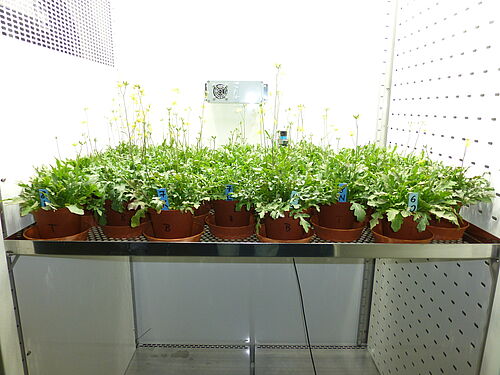Rucola-N-Future

Identification of criteria for breeding and elucidation of N form-effects in two varieties of rucola under future climatic conditions
The producers of vegetable crops have to cope with various phenomenes of the changing climate that are predicted to occur in the future, such as elevated atmospheric CO2 concentrations, increased temperatures and decreased precipitation in the summer. These abiotic factors may impact the susceptibility towards biotic stressors as well. Besides these challenges, both the farmers and the breeders of vegetable crops aim at producing high yields with good qualities. As resource efficiency and environmental aspects are increasingly important along the supply chain, it is probable that the supply of nutrients – such as nitrogen (N) - to vegetable crops will have to be modified as well. Thus, it is necessary to optimize the nutrient supply for the future demand of plants.
The leafy vegetable crop rucola is of special interest as its consumption increases strongly. Little is known on the growth behavior and the product quality when growing under future climatic conditions and with modified N supply. Thus, experiments will be performed in climate cabinets with two rucola varieties differing in their sensitivity towards downy mildew infection. The plants will grow at different atmospheric CO2 concentrations and will receive two different forms of N. Physiological parameters, yield data and internal quality will be assessed.
The results will help to identify relevant parameters for the breeders of rucola. Moreover, it is expected to get information on the N nutrition of rucola under future climatic conditions.
External partner
Enza Zaden Deutschland GmbH & Co. KG
Yara GmbH & Co. KG
Internal partner
Department of Soil Science and Plant Nutrition
Department of Wine Chemistry and Beverage Research
Project period
2016



